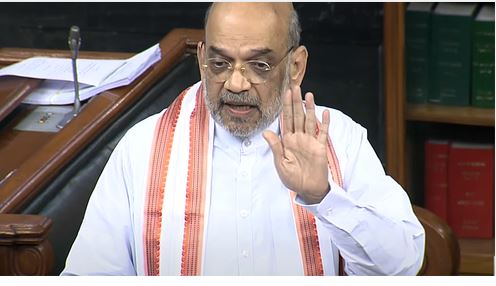
Centre introduces Bills to replace IPC with Bharatiya Nyaya Sanhita, repeal sedition law
text_fieldsNew Delhi: The Union Home Minister today introduced three bills recommending a slew of changes in the legal system, including alterations to the terms of the 1860 Indian Penal Code, the Code of Criminal Procedure, and the Indian Evidence Act. This move aims to replace the country's antiquated colonial-era criminal laws.
The proposed legislation, collectively known as the Bharatiya Legal Reforms, seeks to replace the 1860 Indian Penal Code, the Code of Criminal Procedure, and the Indian Evidence Act with the Bharatiya Nyaya Sanhita, Bharatiya Nagarik Suraksha Sanhita, and Bharatiya Sakshya respectively. This monumental reform has been referred to a Standing Committee for a thorough review.
A notable provision in the new laws is the introduction of an offence related to acts of secession, armed rebellion, subversive activities, separatism, and threats to India's sovereignty, unity, and integrity.
Union Home Minister Amit Shah, while announcing the reforms, declared the repeal of the controversial sedition law. Instead, Section 150 has been incorporated to address acts endangering the nation's core values. The proposed legislation delineates penalties, including imprisonment ranging from seven years to life, as well as fines, for such offenses.
The sedition law "has been repealed", the home minister said.
The word "sedition" is not in the proposed law. It is replaced by Section 150 for acts endangering the sovereignty, unity and integrity of India.
"Whoever, purposely or knowingly, by words, either spoken or written, or by signs, or by visible representation, or by electronic communication or by use of financial means, or otherwise, excites or attempts to excite, secession or armed rebellion or subversive activities, or encourages feelings of separatist activities or endangers sovereignty or unity and integrity of India; or indulges in or commits any such act shall be punished with imprisonment for life or with imprisonment which may extend to seven years and shall also be liable to fine," it says.
In a progressive step towards addressing gender disparities and safeguarding vulnerable sections of society, the bills prioritize crimes against women and children. Stricter penalties, including the death penalty for the rape of minors and 20 years to life imprisonment for gang rape, underscore the government's commitment to ensuring safety and justice.
The death sentence has been retained in the new bills.
The explanation states this: "Comments expressing disapprobation of the measures, or administrative or other action of the Government with a view to obtaining their alteration by lawful means without exciting or attempting to excite the activities referred to in this section."
The legislation also prioritises laws for crimes against women and children, murders and "offences against the state".
For the first time, community service will be one of the punishments for petty offences.
Also, offences have been made gender-neutral. In order to deal effectively with the
In a significant departure from the past, the Bharatiya Legal Reforms introduce the concept of community service as a punishment for minor offences. The reforms also embrace gender neutrality, making offences applicable to all citizens equally. Additionally, recognizing the evolving nature of crime, the bills introduce provisions for combating organized crime and terrorist activities, with substantial penalties to deter potential wrongdoers.
Amit Shah emphasized that the primary objective of the revamped legal framework is not merely punitive, but rather to ensure justice prevails. By discarding laws rooted in the colonial era, India aims to create a robust legal system that safeguards citizens' rights while promoting a sentiment against criminality.
The proposed legislation's retention of the death sentence has sparked debates, with proponents asserting its deterrence value and opponents highlighting concerns over human rights.
This ambitious legislative transformation signals a resolute stride toward a modern, just, and equitable legal framework, rooted in the principles of safeguarding citizen rights, ensuring justice, and upholding national integrity. The Bharatiya Legal Reforms, once implemented, are poised to shape a new era in India's legal landscape.






















